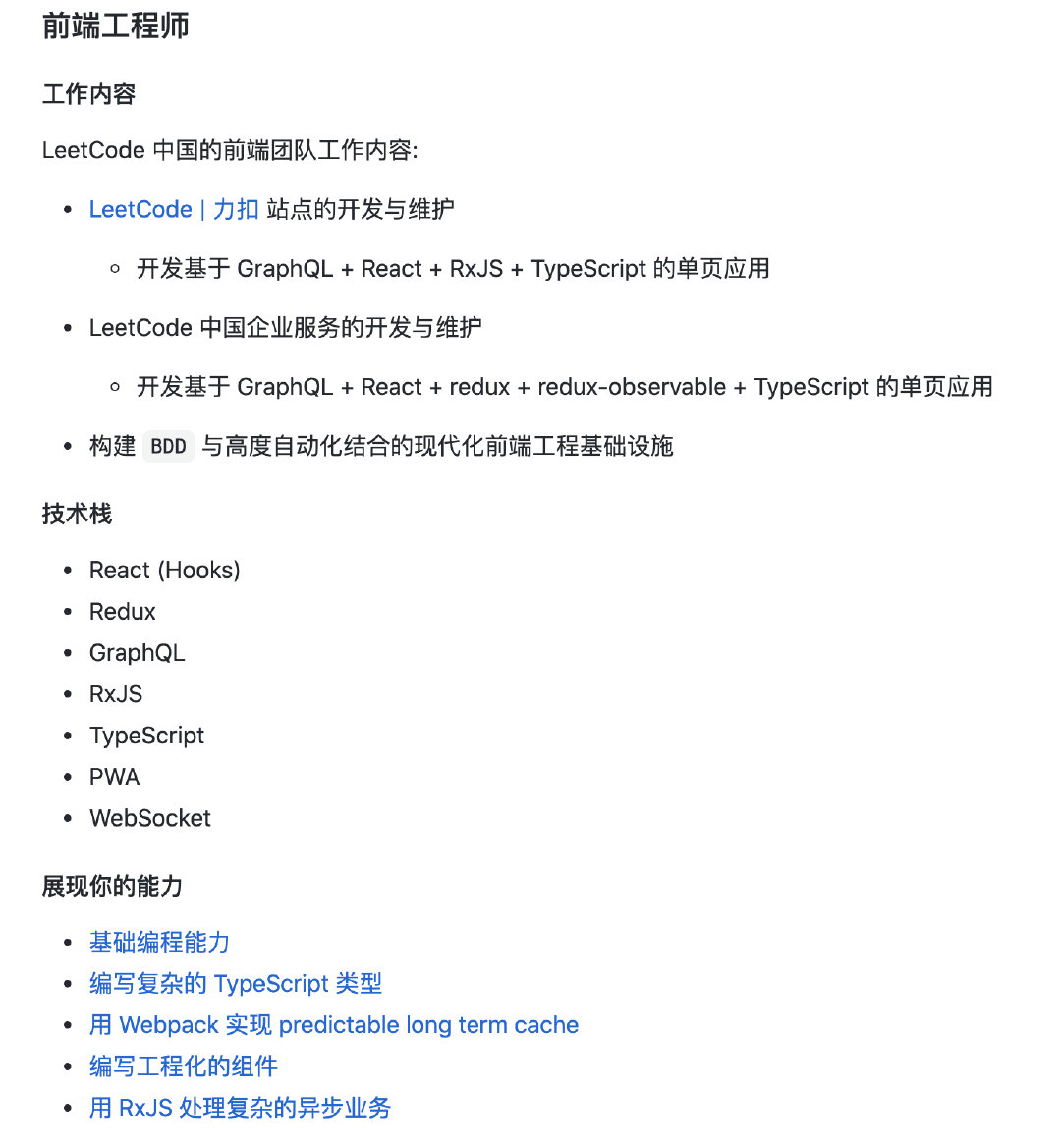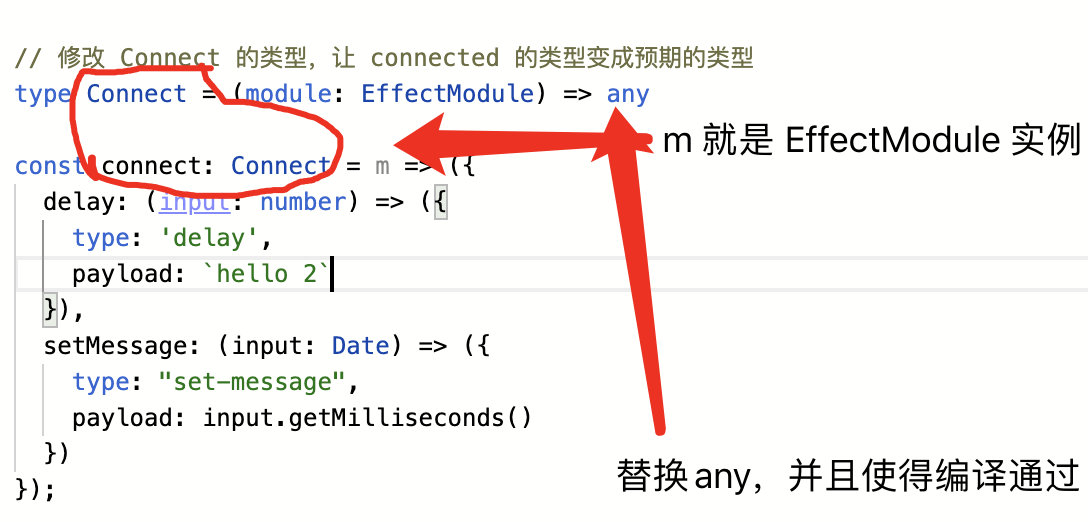2018 年底的时候,力扣发布了岗位招聘,其中就有前端,仓库地址:https://github.com/LeetCode-OpenSource/hire 。与大多数 JD 不同, 其提供了 5 道题, 并注明了完成一个或多个面试题,获取免第一轮面试的面试机会。完成的题目越多,质量越高,在面试中的加分更多。完成后的代码可以任意形式发送给 jobs@lingkou.com。以上几个问题完成一个或多个都有可能获得面试机会,具体情况取决于提交给我们的代码。

(力扣中国前端工程师 JD)
今天我们就来看下第二题:编写复杂的 TypeScript 类型。通过这道题来看下, TypeScript 究竟要到什么水平才能进力扣当前端?
其它四道题也蛮有意思的,值得一看。
问题描述
假设有一个叫 EffectModule 的类
1 | class EffectModule {} |
这个对象上的方法只可能有两种类型签名:
1 | interface Action<T> { |
这个对象上还可能有一些任意的非函数属性:
1 | interface Action<T> { |
现在有一个叫 connect 的函数,它接受 EffectModule 实例,将它变成另一个对象,这个对象上只有EffectModule 的同名方法,但是方法的类型签名被改变了:
1 | asyncMethod<T, U>(input: Promise<T>): Promise<Action<U>> 变成了 |
1 | syncMethod<T, U>(action: Action<T>): Action<U> 变成了 |
例子:
EffectModule 定义如下:
1 | interface Action<T> { |
connect 之后:
1 | type Connected = { |
要求:
在 题目链接 里面的 index.ts 文件中,有一个 type Connect = (module: EffectModule) => any,将 any 替换成题目的解答,让编译能够顺利通过,并且 index.ts 中 connected 的类型与:
1 | type Connected = { |
完全匹配。
以上是官方题目描述,下面我的补充
上文提到的index.ts 比 题目描述多了两个语句,它们分别是:

(题目额外信息)
思路
首先来解读下题目。 题目要求我们补充类型 Connect 的定义, 也就是将 any 替换为不报错的其他代码。
回顾一下题目信息:
- 有一个叫
connect的函数,它接受 EffectModule 实例,将它变成另一个对象,这个对象上只有EffectModule 的同名方法,但是方法的类型签名被改变了 - 这个对象上还可能有一些任意的非函数属性
- 这个对象(EffectModule 实例)上的方法只可能有两种类型签名
根据以上信息,我们能够得到:我们只需要将作为参数传递进来的 EffectModule 实例上的函数类型签名修改一下,非函数属性去掉即可。所以,我们有两件问题要解决:
- 如何将非函数属性去掉
- 如何转换函数类型签名
如何将非函数属性去掉
我们需要定义一个泛型,功能是接受一个对象,如果对象的 value 是 函数,则保留,否则去掉即可。不懂泛型的朋友可以先看下我之前写的文章: 你不知道的 TypeScript 泛型(万字长文,建议收藏)
这让我想起了官方提供的 Omit 泛型 Omit<T,K>。举个例子:
1 | interface Todo { |
官方的 Omit 实现:
1 | type Pick<T, K extends keyof T> = { |
实际上我们要做的就是 Omit 的变种,不是 Omit 某些 key,而是 Omit 值为非函数的 key。
由于 Omit 非函数实际就就是 Pick 函数,并且无需显式指定 key,因此我们的泛型只接受一个参数即可。 于是模仿官方的 Pick 写出了如下代码:
1 | // 获取值为函数的 key,形如: 'funcKeyA' | 'funcKeyB' |
使用效果:
1 | interface Todo { |
可以看出,PickFunc 只提取了函数属性,忽略了非函数属性。
如何转换函数类型签名
我们再来回顾一下题目要求:

也就是我们需要知道怎么才能提取 Promise 和 Action 泛型中的值。
实际上这两个几乎一样,会了一个,另外一个也就会了。我们先来看下 Promise。
从:
1 | (arg: Promise<T>) => Promise<U> |
变为:
1 | (arg: T) => U; |
如果想要完成这个需求,需要借助infer。只需要在类型前加一个关键字前缀 infer,TS 会将推导出的类型自动填充进去。
infer 最早出现在此 官方 PR 中,表示在 extends 条件语句中待推断的类型变量。
简单示例如下:
1 | type ParamType<T> = T extends (param: infer P) => any ? P : T; |
在这个条件语句 T extends (param: infer P) => any ? P : T 中,infer P 表示待推断的函数参数。
整句表示为:如果 T 能赋值给 (param: infer P) => any,则结果是 (param: infer P) => any 类型中的参数 P,否则返回为 T。
一个更具体的例子:
1 | interface User { |
这些知识已经够我们用了。 更多用法可以参考 深入理解 TypeScript - infer 。
根据上面的知识,不难写出如下代码:
1 | type ExtractPromise<P> = { |
提取 Action 的 代码也是类似:
1 | type ExtractAction<P> = { |
至此我们已经解决了全部两个问题,完整代码见下方代码区。
关键点
- 泛型
- extends 做类型约束
- infer 做类型提取
- 内置基本范型的使用和实现
代码
我们将这几个点串起来,不难写出如下最终代码:
1 | type ExtractContainer<P> = { |
完整代码在我的 Gist 上。
总结
我们先对问题进行定义,然后分解问题为:1. 如何将非函数属性去掉, 2. 如何转换函数类型签名。最后从分解的问题,以及基础泛型工具入手,联系到可能用到的语法。
这个题目不算难,最多只是中等。但是你可能也看出来了,其不仅仅是考一个语法和 API 而已,而是考综合实力。这点在其他四道题体现地尤为明显。这种考察方式能真正考察一个人的综合实力,背题是背不来的。我个人在面试别人的时候也非常喜欢问这种问题。
只有掌握基础 + 解决问题的思维方法,面对复杂问题才能从容不迫,手到擒来。
大家也可以关注我的公众号《脑洞前端》获取更多更新鲜的前端硬核文章,带你认识你不知道的前端。

知乎专栏【 Lucifer - 知乎】
点关注,不迷路!



